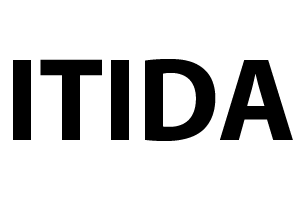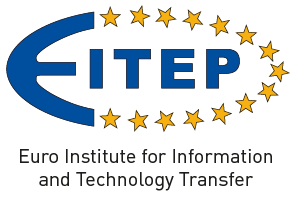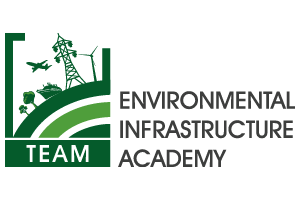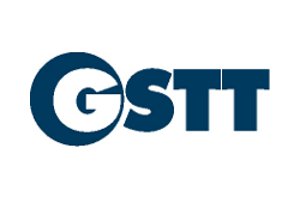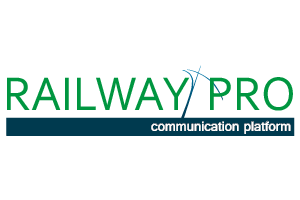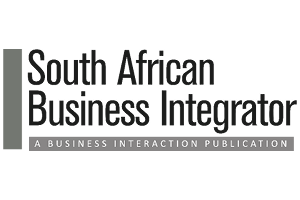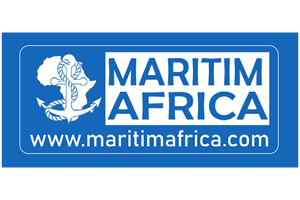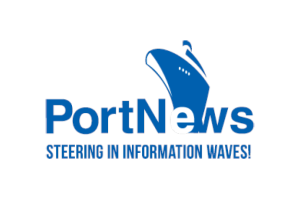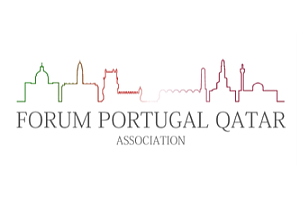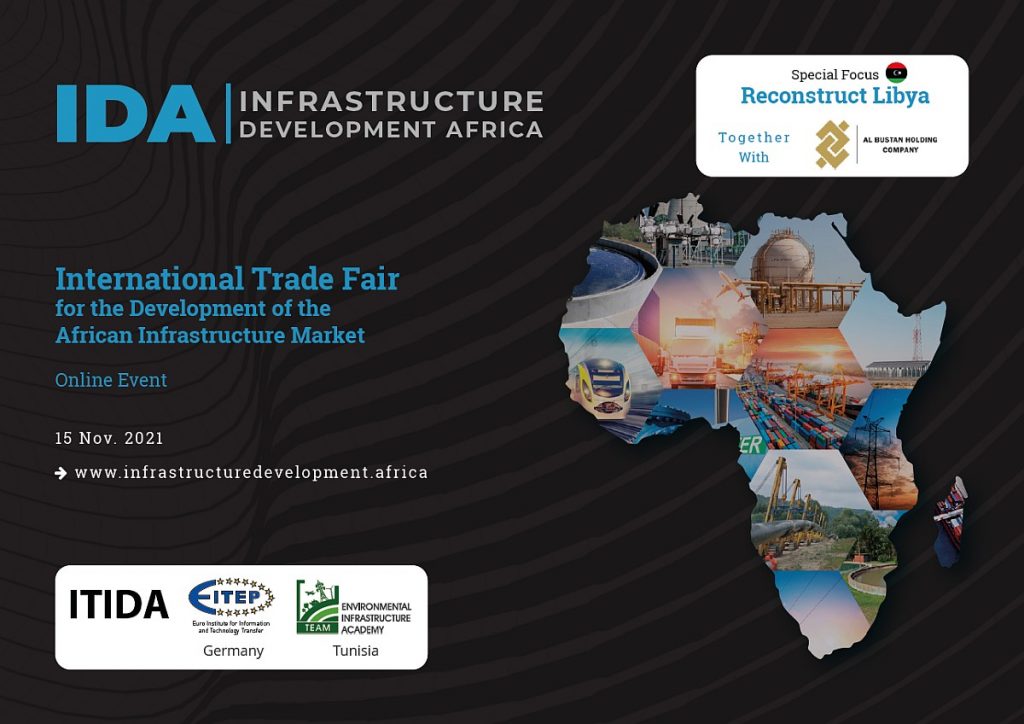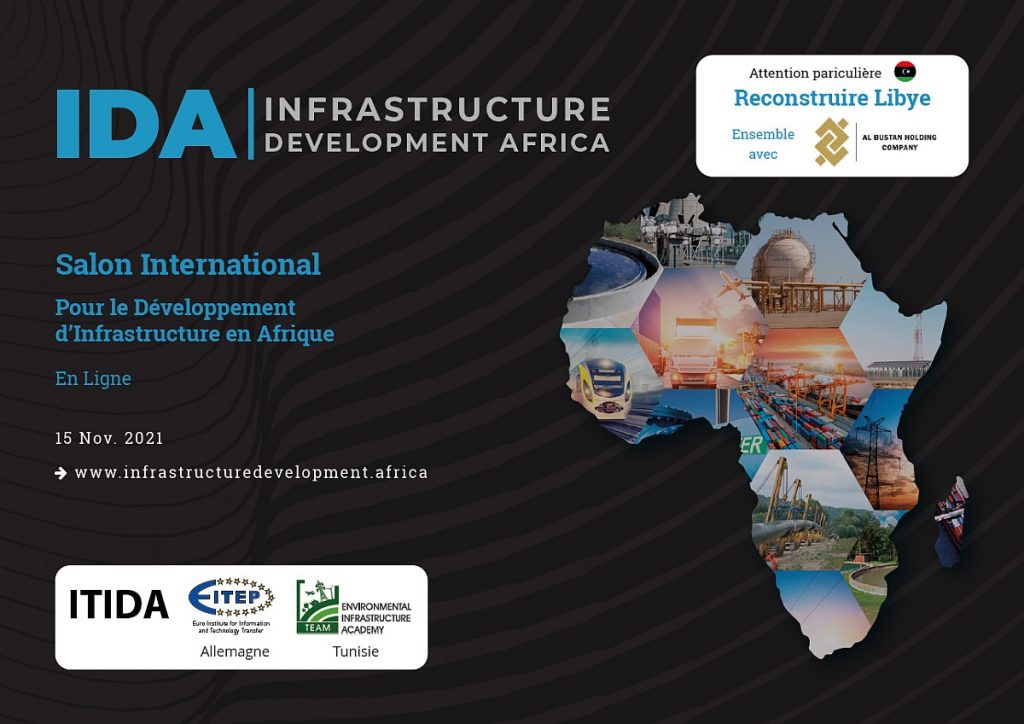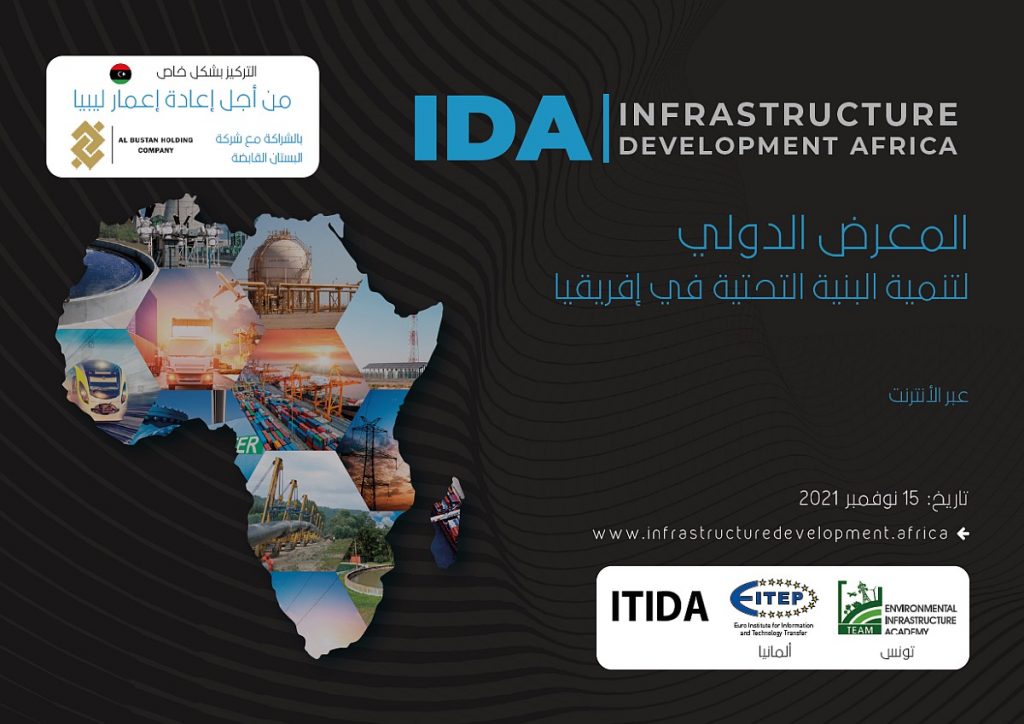Final Report of IDA 2021
On the 15th of November 2021 IDA began with a call from important players in the infrastructure industry for improved public-private partnerships to upgrade the continent's infrastructure and drive industrial growth.
The organizer, the International Transfer Centre for Infrastructure Development in Africa (ITIDA) is an association of infrastructure developers that seeks to promote and enable to improve infrastructure development activities in Africa with the expertise of European and International companies, by creating a network that will foster continuous dialogue amongst its members.
ITIDA was incorporated in January 2020 by its founding members:
▸ Euro Institute for Information and Technology Transfer in Environmental Protection EITEP, Germany (International conferences, exhibitions, seminars, training, exchange of experience, international trade journals, newsletters, etc.)
▸ Training and Education in Africa and Middle East TEAM Academy, Tunisia (Training center and contact offices for international affiliates, etc.)
Already after the first gathering, IDA proved that it is a unique meeting place for bringing together business to discover new trading prospects, launch additional business networks, build partnerships tackling some of the continent’s needs.
IDA 2021 focused on the development of technical infrastructure in Africa discussing the following topics: energy & water; transportation & logistics; water & waste as well as communication & information.
In his welcoming Dennis Fandrich, Director Conferences noted that “Africa is undergoing a process of economic transformation. The continent has the potential to become the largest growth region in the coming decades. The increasing purchasing power of the young African population, numerous investment projects and major leaps in technology offer good opportunities for further development in Africa”.
IDA is one of many planned activities of ITIDA to estimate accomplishments and challenges the continent is confronting in infrastructure development and to develop for the future.
The growing private sector of small African companies is playing an increasingly important role, as it creates many jobs and is important for the longer life of infrastructure projects.
IDA hosted a special panel discussion under the Title Reconstruct Libya. With the new government Libya is already working hard to change the image and improve investments. H.E Dr Jamal Ali, Chairman of the Board of the Ministry of Economy and Trade in Libya stated that “Libya already started private sector development through greater public/private dialogue and promotion of key enabling environment reforms designed to encourage private investment and economic diversification”. In his turn Mr. Ali Al Mesned, Chairman of Al Mesned International Holding stressed “Qatar's commitment to doing everything that would lead to achieving the aspirations of the brotherly Libyan people for security, stability and prosperity”.
Leveraging the private sector is essential for boosting growth in Africa. IDA's panel discussions on ports and the presentations focused on the private sector development for reducing poverty and supporting sustainable growth on the continent.
Videos from IDA 2021
Speakers of IDA 2021
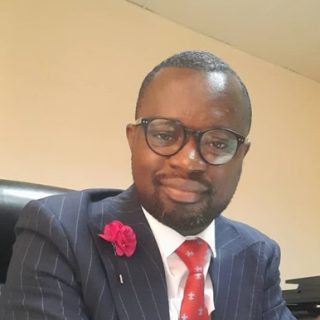
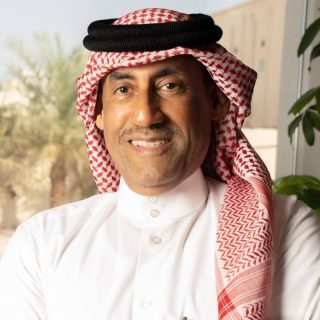
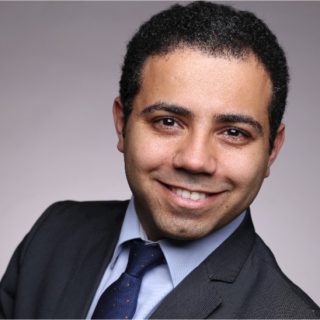
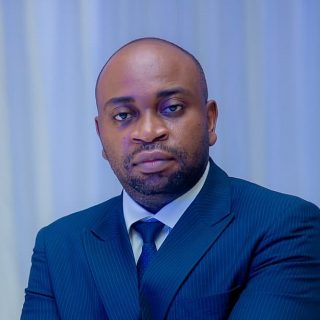
Bodom Matungulu
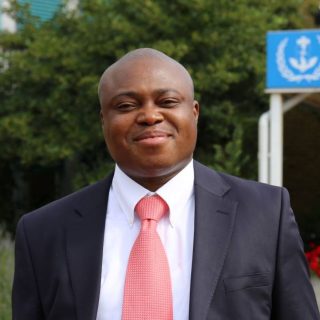
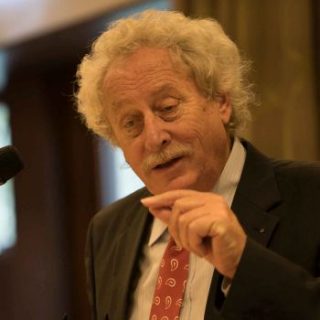
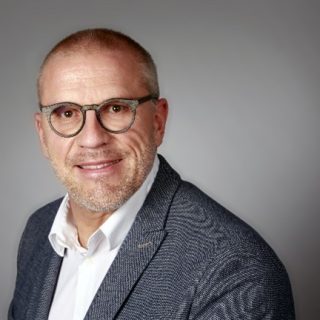

Gamal Ali

Hala Bugaighis
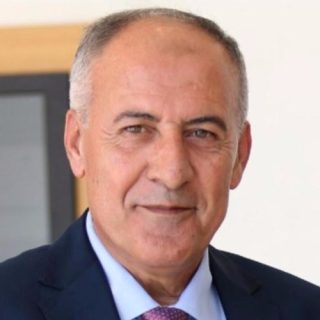

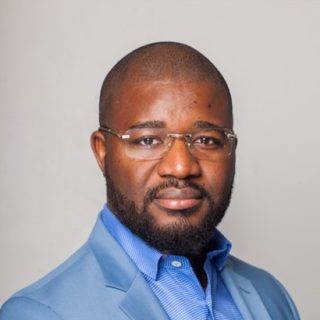
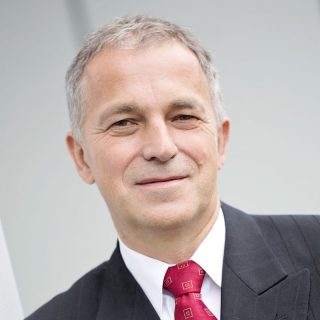

Kris Kosmala
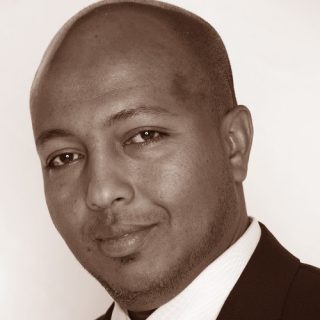
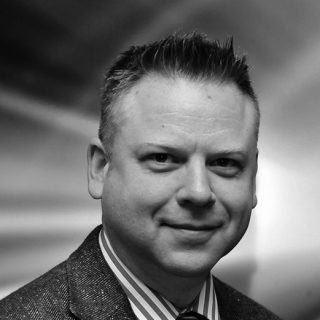
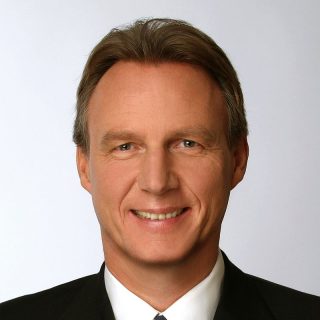
Prof. Jens Hölterhoff

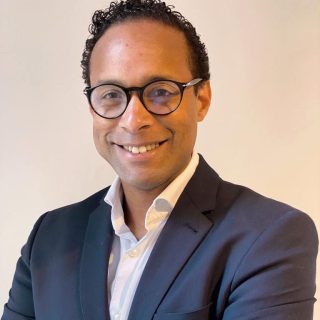
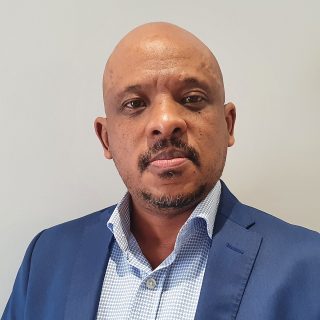
Sonwabo Mdwaba
Schedule of IDA 2021
14:00-14:05 "Welcome"
Dr. Klaus Ritter, CEO, ITIDA, Germany
14:05-14:10 "Keynote Speech: Infrastructure Development in Africa"
Bodom Matungulu, Expert, Technical Advisor in Charge of Infrastructure Projects, Présidence de la République Démocratique du Congo, Congo
Addressing Infrastructure Gap is Key to Africa’s Transformation.
The continent’s infrastructure deficit in all sectors, including roads, water, energy, transport and weak communication networks is a critical brake on the continent’s economic transformation.
Lack of sufficient and reliable infrastructure continues to constrain Africa’s potential for growth and economic transformation.
To fill this gap, it is necessary to find innovative sources of financing but also to improve the institutional and regulatory framework in order to facilitate the attraction of private investment.
14:10-14:15 "Keynote Speech: Africa's Need for an Accelerated Infrastructure Development"
Johnny Muteba, Founder and Chairman, Pan African Chamber of Commerce, South Africa
The African continent needs to accelerate its infrastructure development to match it’s growing population and rapid urbanization to achieve development goals.
With rapid urbanization and a tenfold increase in water needs for energy production, there is an urgent need to mobilize more financial and technical resources for infrastructure projects and plans, to support the continent’s economic development goals.
Africa’s population is projected to reach 1.6 billion by 2030, according to the United Nations, that would further put pressure on water resources and food production sectors.
According to the African Union Commission, the poor state of infrastructure in Sub-Sahara Africa in respect to electricity, water, roads and ICT, reduces national economic growth by 2 percent and productivity by as much as 40 percent
14:15-14:45 "Panel Discussion: Reconstruct Libya"
Session Chair: Hala Bugaighis, Director / Non-resident fellow, Jusoor Center for Studies and Development / Middle East Institute, Libya
Panelist: Ali Al Mesned, Chairman, AL MESNED International Holding, Qatar
Panelist: Gamal Ali, Chairman of the Board, Ministry of Economy and Trade – Privitization and Investment Board, Libya
Panelist: Imad Al Saed, Task Team Lead, The World Bank, Libya
14:45-14:55 "Networking Break"
– Visit the virtual exhibition
– Browse the list of participants
– Chat with other participants
14:55-15:25 "Panel Discussion: Key Challenges of African Ports"
Session Chair: Kris Kosmala, Partner, Click & Connect, Australia
Panelist: Afri Esaie Kouassi, Officer in Charge of Missions, San Pedro Port, Côte d’Ivoire
Panelist: Mowlid Aden, Director, Djibouti Ports and Free Zones Authority (DPFZA), Djibouti
Panelist: Kana Mutombo, Port Consultant, World Bank, United States
15:25-15:45 "A modern rail system that will transform the everyday"
Bichoi Metias, Head of Sales Middle East & Africa, Mobility Turnkey, Siemens, Germany
The building of the Cairo-Cape Town railway line is a huge step taken by the Egyptian and African governments, aiming to boost connectivity in Africa through infrastructure, and to connect Egypt with other African countries. This session will introduce the biggest railway plans and projects in Egypt, and potentials for international partnerships and cooperation in Egypt’s railway sector.
15:45-16:05 "The Energy Transition and its Impacts in Africa"
Rui Retagi, Managing Director, Guthumba Consultancy Services, France
The energy transition is necessary globally if we would want to achieve 1.5 degrees as per Paris Agreement and thus limiting global warming. As our lifestyle is constantly evolving and developing, as the case of the African Economies, this directly implies that a substantial increase of its energy consumption to leverage its developing needs is required. Although power generation has evolved efficiently to attain Africa’s requirements over the last few decades, the energy source is still mostly coming from biomass and fossil fuels, totaling 83% in 2021 of its energy mix. The deliberate burning of biomass and fossil fuels are unarguably the cause of the global rising temperatures. However, must Africa’s not leverage its untapped fossil fuel reserves to attend its developing needs as suggested recently at COP26? Regardless its reliance in fossil fuels, Africa only accounts for 3,9% of globally carbon emissions and within its energy mix its cleaner sources have been increasing, acquainting to 20% of its electricity generation. In lieu of requirements to achieve the energy transition within the continent the approach should be seen phased with specific targets for 2030, 2040 and or 2050 to achieve carbon neutrality as suggested by the major African economies at COP26. This would allow decision makers to tackle the current shortcomings within the continent such as the strengthening of the grid and its efficiency, increasing its transmission infrastructure coverage, creating regulatory intermarket related policies to optimize demand resilience, investing in capacity building and skills transfer, whilst still supporting innovation through renewables and green hydrogen, and also, increase in developing of critical minerals to support global the demand of energy storage capabilities. Therefore, to support the continents sustainable energy transition, it would require that the policymakers are allowed in one way increase their revenues through fossil fuels increase exports, allow cross boarders agreements to instill economic development whilst innovative financing instruments are available therein.
16:05-16:10 "Welcome from the German Society of Trenchless Technology"
Prof. Jens Hölterhoff, Chairman of the Board, German Society for Trenchless Technology e.V. (GSTT), Germany
The German Society for Trenchless Technology advocates the pioneering trenchless technology that combines economic efficiency and environmental protection. This modern approach for installing underground supply lines can be utilized for drinking water, wastewater, gas, heating, telecommunications or electricity lines. GSTT’s goal is to promote this modern technology that has been proven and tested worldwide for 35 years. Together with international partners, GSTT is continuously working on advancing the science and the practice of trenchless technology for the public and environmental benefit.
16:10-16:30 "Trenchless new installation and rehabilitation of water and sewer pipelines"
Olaf Kempcke, Managing Director, TRACTO-TECHNIK AFRIQUE S.A.R.L., Morocco
The water industry worldwide faces the constant challenge of securing the supply of high-quality drinking water and adapting the capacities of the pipework system to increasingly growing customer demand. In order to ensure this, while keeping costs for utilities and consumers as low as possible, trenchless technologies offer sustainable and reliable solutions. By installing water conduits and water service connections without trenches, the costs of adapting the water piping network are kept as low as possible for suppliers and consumers, the environment is protected and the supply is secured in the long term.
Using Nodig technology for water main installation, you can build and maintain your supply network in a profitable and environmentally friendly way. Various methods can be applied, from the installation of pressure pipes for water transport and distribution, to the fitting of a house connection and the sustainable renewal of damaged water pipework.
All across the world, the sewerage systems transport billions cubic meters of wastewater a year, which is loaded with various pollutants. In order to prevent infiltration of the groundwater, sewer construction is subject to strict regulations. To ensure absolute tightness and positional accuracy of pressure and gravity pipes to pumping stations, manholes, collectors and buildings, sewer construction requires maximum precision. This precision is guaranteed using innovative trenchless drainage solutions for installing, renovating or renewing sewerage systems. Cleaning of wastewater pipes is also possible.
NODIG systems for pipe renewal are perfectly suitable for the sustainable renewal of damaged drain pipes and house connections with minimum constructional and financial expenditure, and for the renovation of sewerage systems. Plus you can simultaneously adapt the wastewater pipe capacity by 1 – 2 nominal widths, when replacing old sewer pipes that way.
16:30-16:50 "Work based online training as a prerequisite for water infrastructure development"
Dr. Robert Stein, Managing Partner, Prof. Dr.-Ing. Stein & Partner, Germany
The construction, operation and maintenance of our water supply and wastewater disposal infrastructure are certainly among the most complex infrastructure tasks in urban areas. The qualifications of the technicians and engineers working with these systems therefore require regular further training to refresh and expand their expertise. In addition to specialised experts, flexible and independent generalists will increasingly be in demand. All employees are therefore required to continue their professional and personal training and development largely on their own. In this context, the offer of continuous further training for employees – work-based learning – is gaining considerable importance. The aim here is to enable all those involved to perform tasks now and in the future and to react flexibly to changes. This can be done both by providing the necessary expertise and through work based learning. For every organisational network, the question arises of how required knowledge can be gathered, organised and made available for intended applications in specific contexts. The systematic handling of the resource expertise, i.e. knowledge management, will therefore be crucial for public administration, but also for the private sector, to ensure the future performance of urban infrastructure systems. Using the example of a web-based knowledge platform for water and wastewater infrastructure systems, the lecture will present a corresponding solution approach as practised by many municipalities in Germany. It enables all participants to use extensive learning resources, regardless of their educational background. For this purpose, individualised teaching and learning paths are available, which can meet the different needs of the individual with regard to the contents, paths and methods of further education and can integrate these into the
16:50-17:10 "Access, Connectivity hinders Digitalisation of Rural & Peri rural Communities"
Sonwabo Mdwaba, Founder and President, Pan African Information Communication Technology Association (“PAICTA”), South Africa
• Developing rural ICT connectivity across the continent to ensure affordable access to communications infrastructure.
• Everyone needs affordable access to the Internet and access strategies that are not exclusive and will not widen the digital divide.
• Discussing the digital divide in education and health that continues to widen.
• Urgency of rural ICT connectivity across the continent.
• Governments across Africa must provide policy direction such as ICT infrastructure sharing in order to support the growth of internet connectivity, Spectrum, Digital Migration, TV white space etc.
• We need to urgently address access to spectrum in rural areas in order to unlock innovation and investment as spectrum remains dramatically under-utilised in rural areas.
• There must be co-ordinated efforts in engaging the developed world players in getting Africa online.
In 2000, the whole of Africa had less international internet bandwidth than Luxembourg (a country the size of the state of Rhode Island). Two decades later, despite some progress, much of Africa is still unconnected and large populations cannot fully realize the benefits of connectivity.
To reach universal access, an innovative approach is needed as a priority, to connect the unconnected in remote, rural areas currently out of reach of traditional cellular mobile networks and digital infrastructure on the continent. It is estimated that approximately 45% of Africa’s population is further than 10 km from fibre network infrastructure, which is a higher percentage than on any other continent. The proximity to digital infrastructure is not a guaranteed indicator of internet quality, speed, or even take-up. There are of course many other barriers to access, such as affordability (both of service and handsets), the policy, regulatory and fiscal environment, the status of digital skills, gender, age, level of education etc.
Most internet adoption in Africa is driven by mobile connections, if cell towers are not served by fibre (and rely instead on microwave or satellite), then the signal speed and capacity is typically lower, likely restricted to 2.5G and not true broadband. ICT stakeholders (private sector operators, governments and development partners) have to work together to bring more of the African continent online.
17:10-17:15 "Closing"
Rana Alnasir-Boulos, Director, ITIDA / EITEP, Germany
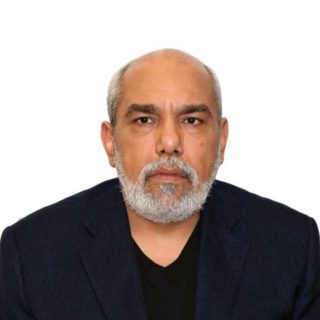
Ali Khalifa Essid
Private investment must be strengthened in Libya because only that creates jobs, prospects and prosperity in the country in the long term.
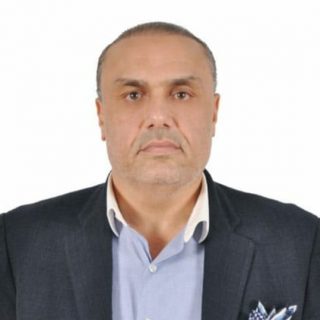
Rida Khalifa Essid
First IDA 2021 is planned to take place in LIBYA as the country urgently needs a reconstruction after 10 years of conflict.

Dr. Klaus Ritter
We seek coordination with the goals set by African institutions and initiatives.

Rana Alnasir-Boulos
Private sector engagement and cross border partnerships play an essential role in triggering economic and sustainable development in Africa.
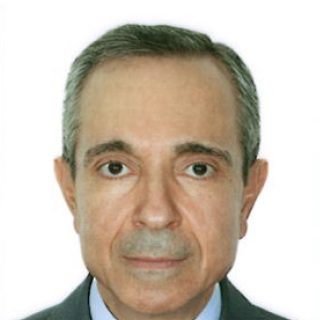
Fethi Mechri
Africa has great potential which makes it the backbone of the global economy in the future - from now on, we must all help Africa build sustainable infrastructure to achieve a better future.

